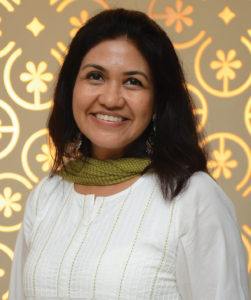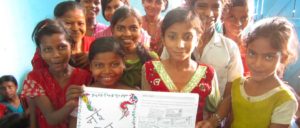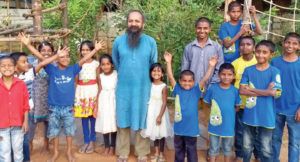Vidya Shah, former CFO of Edelweiss Group and now CEO of EdelGive Foundation, is channelizing all her energy to bring in a venture capital-style funding model to the non-profit sector. And, that’s not all. She wants to build a cohesive philanthropic ecosystem in the country

At The Smart CEO, every single day, we’re at the center of numerous stories on entrepreneurship, innovation and growth. Mega fund-raising rounds, bold technological innovations and entrepreneurs crafting scalable business models are not new to us. From college dropouts turning entrepreneurs to knowledge sharing by leading CEOs, investors and board members, we often capture stories that are crucial for the country’s economic progress.
At one of our events, a leading CEO from the financial services sector urged us to add stories of individuals who’re working towards enabling social progress to our collection. And as he explained why, it made absolute sense to do so. “After all, economic progress without societal progress in tandem will not only result in widening the disparity among the population, but also, over time, hamper economic progress.”
This conversation prompted us to pursue this cover story on EdelGive Foundation, the strategic philanthropic arm of the Edelweiss Group, and the vision of its leader, Vidya Shah.
Shah, the former CFO of Edelweiss, is now deeply focused on bringing in business smarts, with compassion, to the social sector. In her earlier role as CFO, Shah was responsible for Edelweiss’ charity allocation. For over four years, the Group allocated a small portion of the profits to various NGOs. But, by 2007, the requests for funds were a lot more than what one person could manage. It was also a time when Edelweiss was gearing up to go public, and Shah wanted to step down from the role of the CFO.
“I travelled a fair bit within India, and took time off to visit the charities we had funded. One of the organizations I visited was the Samaritan Help Mission in Kolkata. Founded by Mamoon Akhtar, the NGO was using education as a tool to solve societal problems in the Tikiapara district of Kolkata. Mamoon ran an illiteracy elimination programme to prevent children from falling prey to the local mafia and being forced into prostitution, bootlegging or begging. I visited two other NGOs, and realized, I really wanted to do this full-time and value-add with my business experience,” explains Shah. She formally setup EdelGive foundation in 2008.
During her travels, Shah realized that it was not only the availability of funds that made a difference to its investee companies, but also the ability of the investor to aid in capability building and handholding.

A new model for Giving
The key to understanding EdelGive’s operational model is that, it doesn’t operate in a silo. Instead, EdelGive’s operations are deeply linked to employees of the Edelweiss Group, who spend time on shaping up the business process, operational efficiency and scalability of an NGO. Shah says, “It is certainly not a CSR arm that is separate from rest of the organization.” Till date, over 35 per cent of employees from the Group have contributed over 8500+ hours to social causes of the foundation. “It is not only CSR, but also an employee engagement initiative,” adds Shah.
From a portfolio selection perspective, Shah is adopting a venture capital-like model. She evaluates pitches based on genuineness and quality of the team, critical nature of the problem being solved and the potential for sizable impact. Additionally, the sustainability of the NGO over the long run is analyzed as well. Over the years, Shah has also fine-tuned her approach, to focus on specific themes.
For now, EdelGive focuses on three key areas of societal development – education for the underprivileged, aiding in livelihood and women empowerment. It collaborates with other foundations and philanthropic bodies to help its portfolio NGOs. Additionally, it organizes the India NGO Awards, in partnership with the Rockefeller Foundation and Resource Alliance, to recognize and honour non-profits in three categories – small, medium and large.
Shah opines that, it is crucial to build a credible ecosystem for philanthropists and work closely with corporates, NGO leaders and other key stakeholders. She is convinced that “collaborative philanthropy” is the way forward.

Educating the underprivileged
One of India’s core problems, without doubt, is illiteracy.
India’s urban entrepreneurship ecosystem may be filled with education startups that are adapting to the Internet and mobile age. From an online marketplace for math teachers to finishing schools for employability, there are several business models that are gaining attention. This segment of education entrepreneurship attracts venture capital dollars, primarily because the potential market size is humongous.
However, on the other end of the spectrum, in slums and poor India, problems in education are localized. You may find an underprivileged Dalit community, where girls are not sent to school or for that matter, migrant workers in Mumbai, working in the daytime and attending night schools. These are not your typical ‘big problem-large market’ type of opportunities, which typically attracts investment dollars. An NGO (or a social enterprise with a focus on double bottom-line) may rather do really well here to impact the lives of 1000-odd people and make a meaningful difference to their lives. It is such opportunities that philanthropic capital can solve. And, EdelGive’s senior team and Shah understand this really well.
The three key focus areas at, on the education front, are – reducing dropout rates, enhancing learning outcomes and transforming attitudes and aspirations. Till date, EdelGive has supported (given grants) over 60 NGOs in the last seven years, out of which 16 have been in the education space.

For Shah, investing in education, has been a learning experience and more importantly, proof that there is very high, tangible and intangible, impact. One of the investee companies, Masoom, is a classic example. It was started by a very young NGO leader, Nikita Ketkar, who wanted to improve the quality of night schools in Mumbai. Night schools were conceptualized for motivated people who work in the daytime but want to complete school at night. But, Ketkar identified that a major challenges were poor quality of education and lack of proper learning outcomes. With a grant from EdelGive, she created educational material and also ensured holistic development of the students enrolled in various night schools. Till date, Massom has educated over 500 students across 15 night schools in Mumbai and 72 per cent of the students have passed their SSC exams.
EdelGive also invested in Manitham Charitable Trust, an NGO started by Vanarajan Swamidoss. Manitham’s core focus is on educating Dalit girls in various villages in South India with a dual focus – empowering them with overcoming discrimination and also educating them on core subjects. This NGO operates in 15 villages in Tamil Nadu and has impacted over 3600 people in the Dalit Community.
There are several such examples and Shah is convinced that such ideas will do really well and scale up with the right kind of philanthropic capital. The key is to have a strategic scale up plan in place, where the NGO leaders, learns to let go and hire a support team to impact many more underprivileged individuals. For example, at Manitham, the focus has now expanded beyond Dalit girls and the new goal is to enhance the lives of the whole Dalit community irrespective of gender.
Shah says, “Earlier, we used to evaluate any opportunity that came by in the education space. Now, we’ve gotten smarter. We’ve three primary themes we focus on – learning outcomes, reducing drop out rates and improving the motivation levels and aspirations of people manifold. Except in very rare cases, we don’t invest in building infrastructure or classrooms.”

Impacting livelihoods
In addition to tackling the problem of illiteracy, the other theme that EdelGive has identified is livelihoods. Shah says, “We often have discussions within the foundation on what exactly we mean by livelihood. Is it employability? Is it skilling? To us, it simply means enhancing income levels and employability.”
EdelGive has supported a multitude of non-profits in the space. For example, Aajeevika Bureau offers a whole lot of services for migrant workers including photo IDs, legal aid, skills training and job placement. Another one called the Mann Deshi Foundation offers a variety of non-financial services, including training on basic business skills, leadership and even technology for rural women micro-entrepreneurs. It has progressed so much, it has recently formed a Chamber of Commerce for rural women entrepreneurs and its ambitiously christened Mann Deshi Business School has helped several women start and expand over 50,000 micro-entrepreneurial businesses.
Shah emphasizes on the community-effect in all its endeavors. “Unless you get the local community involved, progress cannot be sustained. It needs to come from within,” she explains.
Additionally, Shah also realizes that grant funding cannot be given perpetually. The trustee or NGO entrepreneur must work towards making initiatives self-sustaining. Its customers or beneficiaries must pay a small fee to avail the offering.
In addition to serving the underprivileged, the other key focus on the livelihood side is up-skilling. One of its investee NGOs is focused on helping migrant workers do better and grow, both from an income perspective as well as quality of work. If someone is a head loader in the real estate sector, to goal is to see if its possible to up-skill this person and help him or her move up the hierarchy.
Shah says, “We arrived at many of these themes and ideas through experimentation. We keep doing pilots, keep pushing the boundary on what we mean by livelihood. We’ve now started to look at water-related projects – building dams and so on. The key to such projects is to involve the local community right from the time of conceptualizing and use them for construction. This helps people in the local community get a sense of ownership.”
While Shah has led EdelGive to make over 60 investments in NGOs over the last seven years, she agrees that it is only the tip of the iceberg. It is a constant learning experience and she knows that India needs many, many more such philanthropic endeavors.
As we wrap up, Shah repeats a phrase she touched upon briefly earlier in the interview – “collaborative philanthropy”. She wants to build a philanthropic network of non-profits, corporates, foundations and employees who’ll come together and support on-ground NGOs with not only funds, but also capability building.
One thing is for sure, for inclusive growth, philanthropic capital is crucial and business models like EdelGive can make good case studies for various corporates to emulate. This, in tandem with a booming entrepreneurship ecosystem and wealth creation, will create a viscous cycle of truly inclusive growth.
VIDYA SHAH
CEO, EdelGive Foundation
Former CFO, Edelweiss Group
KEY FOCUS:
Build a collaborative ecosystem for philanthropy where several corporates, employees, NGOs and foundations come together. Help look at the social sector differently.
EDELGIVE’S FOCUS AREAS: Education, Livelihood and Women Empowerment
ITS USP:
Combine grant giving with employee volunteering, to ensure NGOs are imparted business skills and processes
GRANTS GIVEN TILL DATE: Over Rs. 10 crore last fiscal. Overall, has supported 60 NGOs
INVESTEE NGOs IN EDUCATION
Aangan: focused on reducing vulnerability of girls in high-risk community
Samaritan Help Mission: eliminating illiteracy in Tikiapara district in Kolkata
Manitham Charitable Trust: imparting both knowledge-based and motivational learning to the Dalit community
Agastya International Foundation: science education in slum areas
Ibtada: educating underprivileged in Alwar, Rajasthan
INVESTEE NGOs IN LIVELIHOOD
Aajeevika Bureau: ID cards, skilling, placement and legal aid for migrant workers
Mann Deshi Foundation: Non-financial services, including leadership education for rural women micro-entrepreneurs
Medha Learning Foundation: Enabling better lives and career after school
Aroehan: Addressing malnutrition through a five-pronged approach: unemployment, water scarcity, education, health and governance


